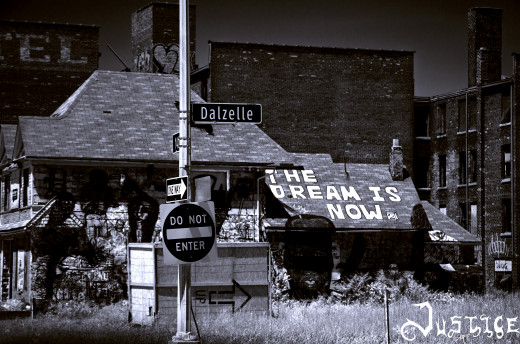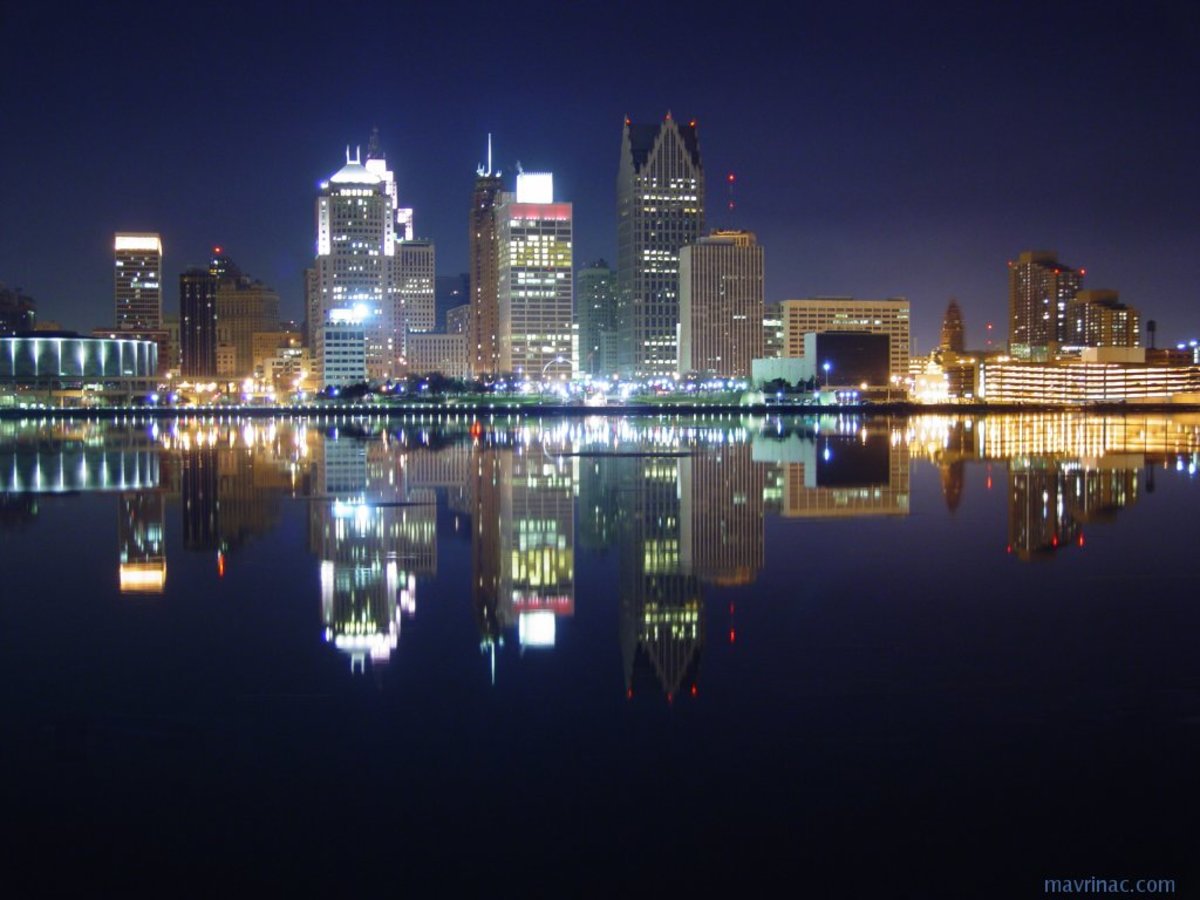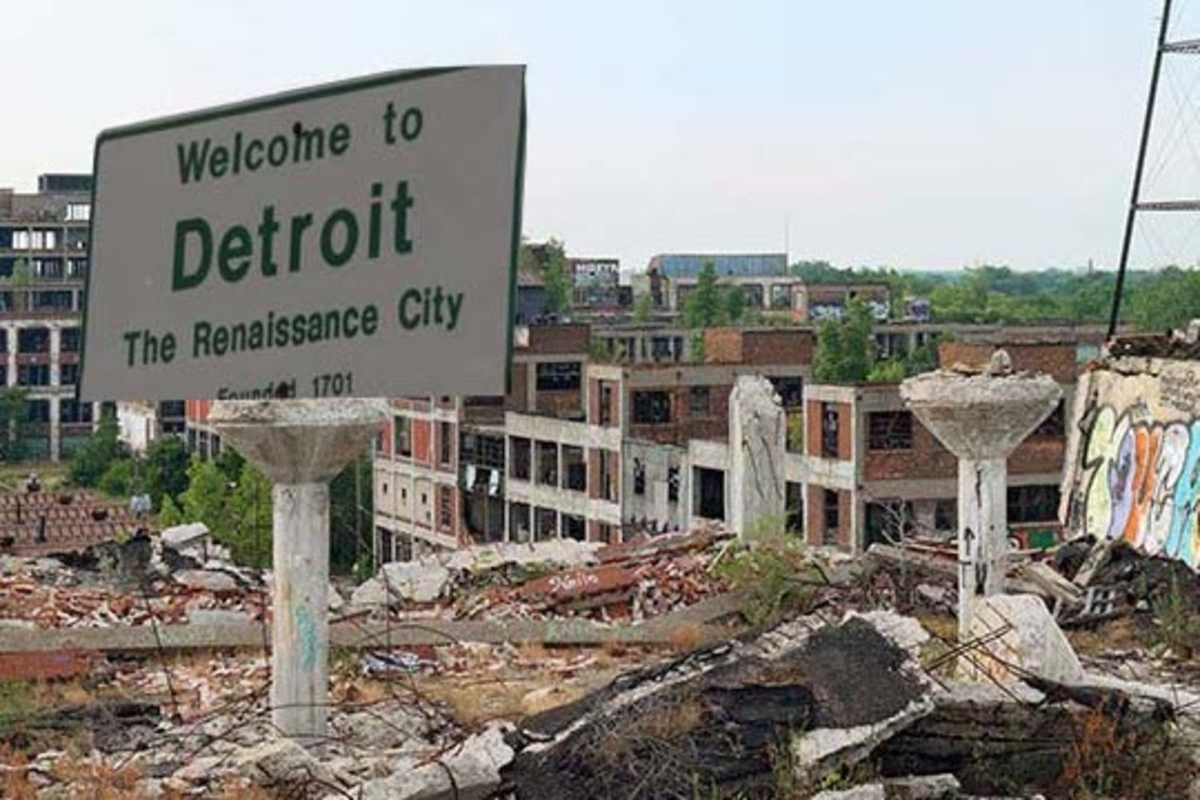Capitalism and Detroit

A Modern Day Picture
Breezing into Detroit from nearby Livonia in many ways gives one all they need to know about the city that once thrived in the glory days of the Big Three. About a mile before entering the city one can start to see how the once beautiful houses have decayed to resemble something out of a post-apocalyptic science fiction film. Entire parts have been stripped away, gaping holes occupy where roof or wall once did. It seems as if no one should live there and yet there are people on every block who call it home.
They live there despite the fact that conditions are unlivable by most American standards, for there is nowhere for them to go. There is no money to fix houses, none even to demolish the ones that have been abandoned. It makes one's skin go cold to look upon the harden faces as you pass by moving closer to the city.
However even once inside the city limits things hardly seem better. With the exception of a select few buildings, such as that of the MGM Grand Hotel, the city shows its age and wear at the slightest glance. Many factories and work places that once lived off the city have been closed and gutted completely. Grass and weeds have overrun areas that haven't been poured over with concrete, often only being stopped by the ghost of industry or under bridges that have become shelters for many of the homeless.
Wandering through the many levels of abandoned buildings that once served as facilities of production, one must be careful of the uneven ground littered with bricks and decay. While the ground floor is damp, dark, and cold, the upper levels have been spared from such signs of depression. Instead the buildings skeletal remains are thrust into the sunlight by windows punctured in the walls as if by canon fire. One can easily look out on the misleading skyline that marks the center of the city.
The city that gave birth to the american industrial revolution with Henry Ford and the assembly line model of production has become a ghost town full of unrest. A true sign of the times, the newest and shiniest product in the city is the massive amount of barbed wire that lines the top and bottom of the two fences that encircle the old train station, keeping the mischievous from entering the premises.

How Capitalism Failed Detroit
It is possible that there is no place in America so tantalizing and seductive for the promoters of capitalism as Detroit-at least the Detroit of the Big Three. The city rode on high while the factories employed a large number of the city's citizens directly and indirectly gave work to those in the business of auto parts. Offering good wages and excellent retirement benefits to the employees, it seemed as if Detroit was leading the way for a brighter future.
Currently the average worker of one of the Big Three's companies makes roughly $60,000 a year, not including benefits. This is decent, nearly 150% of the average American salary and should rightfully lead one to question what the complaining is about or why Detroit shows foreshadows the future of capitalism. Right off the bat it should be noted that only two of the three are still American owned companies, with GM belonging to the US Treasury and Ford still owning Ford. Chrysler on the other hand is now owned by the foreign car company Fiat.
Going a little further, while the average salary is fairly good, so is the CEO salary. In 2012 Ford's CEO Alan Mulally was paid $2 million with another $3.95 million coming in bonuses. That's excluding the stock options and other benefits that he cashes in on each year. In total he earned $21 million, which is a near 30% drop from the $29.5 million he made in 2011.
Among the other highest paid employees at Ford this past year were Executive Chairman Bill Ford earned $3.1 million between salary and bonuses alone, not including stock and equity which made his total earnings $14.8 million for the year. The COO Mark Fields was paid $3.7 million in salary and bonuses as part of his $8.9 million compensation for the year. The new CFO Bob Shanks made $5.2 million in compensation, $1.49 million coming from salary and bonus. The outgoing CFO Lewis Booth made a little more than half a million dollars in salary and bonus as part of his $3.1 million in compensation. Head of global marketing, Jim Farley made $1.36 million in salary and bonuses as part of a $4.6 million compensation.
To do the math, in salary and bonuses alone, these six men made roughly $16.1 million dollars on their salary and bonuses alone. With stock and equity, they made a total of $56.7 million dollars for 2012 alone. The 45,800 UAW members (United Auto Workers) got a record high $8,300 in stock and equity bringing the grand total for the average worker up to $68,300.
Here's the kicker for Detroit, 20% of the city is unemployed and of those who are employed, the average income is roughly $26,000. While Ford (along with GM and Chrysler) kept the city going for years, it left its workers in the dust for greener pastures. Despite the fact that Ford still keeps up its pay grade for its employees, once the money ran out and bigger profits were to be made outside of the city, they went.
That's the real story of how full on capitalism killed Detroit. Business is all about profit and capitalism thrives on business. With few regulations such as minimum wage, worker safety, and tax payments, the theory goes that businesses that make the most profit employ more people and therefore the better business does, the better the surrounding community does. In theory it sounds like a good practice.
The problem is that when the focus is on corporations rather than individuals, the individuals often suffer. Detroit and its people built Ford from the ground making it into a crown jewel of American economics. When Ford grew up though and wanted to extend its profits, it left the city. It happens and expansion certainly isn't the worst thing in the world for business. Slowly but surely though it forgot the men and women who made it what it was in favor of bigger profits. The fact that it has left a gaping hole in Detroit's economy can be seen from a mile away.
It can be explained simply how it failed and it's for the same reason America's economy is struggling. Capitalism and its profit driven obsession doesn't care about the people that built it. It is a system built ideally for buying materials at low price and selling them high. It means that a few individuals at the top of the corporations make millions a year while paying the people who got their company going minimally. To be fair, no one should blame them, they're doing their job: they're making profit.
It's why companies send their work overseas where worker protection is weak at best. Why pay someone $10.00 an hour when you can pay them $10.00 a day? From a business and profit driven perspective it doesn't make sense to abide by such human rights precautions if you don't have to. However it means that modern nations who are purely capitalist are going to suffer in their industry and exports. Which means that just because companies are doing well, it doesn't mean that the country's people are doing well.
It used to be that the stock market was a pretty good indicator of how the country was doing, when Wall Street was good, Main Street was good too. In recent years we can see that the two are becoming more and more separated. Wall Street can thrive and reel in profits by exploiting the cheapest workers in any corner of the world, whereas Main Street generally buys from companies that offer them the cheapest and best product. As it often turns out, the ones with the cheapest product are the ones that can employ cheap labor, usually in foreign countries. Therefore they build their product cheap and can sell it at market price, offering them the greatest range of profit.
As can be seen with Ford Motor Industries, even when employees are paid decent wages they're dependent on the business being in their area. The area where they build factories and new businesses is depending on where there is money for people to buy their product. Thus areas that are in dire need of businesses to employ citizens struggle to attract businesses because there's no money to buy the product.
Detroit's not the only one who's experiencing the betrayal of capitalism, it's just leading the way. Unless there is an intervention into our current system, America is going to continue to crumble and the inequality gap between rich and poor is going to continue to grow. Unless something is done, Detroit isn't a just a city that has lost its way, it's a sign of things to come.










